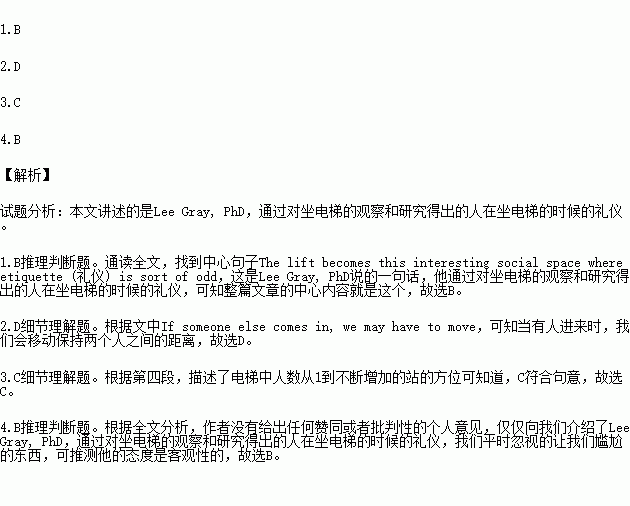题目内容
You may not pay much attention to your daily elevator ride. Many of us use a lift several times during the day without really thinking about it. But Lee Gray, PhD, of the University of North Carolina, US, has made it his business to examine this overlooked form of public transport. He is known as the “Elevator Guy”.
“The lift becomes this interesting social space where etiquette (礼仪) is sort of odd (奇怪的),” Gray told the BBC. “They (elevators) are socially very interesting but often very awkward places.”
We walk in and usually turn around to face the door. If someone else comes in, we may have to move. And here, according to Gray, lift users unthinkingly go through a set pattern of movements. He told the BBC what he had observed.
He explained that when you are the only one inside a lift, you can do whatever you want – it’s your own little box.If there are two of you, you go into different corners, standing diagonally (对角线地) across from each other to create distance.When a third person enters, you will u nconsciously form a triangle. And when there is a fourth person it becomes a square, with someone in every corner. A fifth person is probably going to have to stand in the middle.
nconsciously form a triangle. And when there is a fourth person it becomes a square, with someone in every corner. A fifth person is probably going to have to stand in the middle.
New entrants to the lift will need to size up the situation when the doors slide open and then act decisively. Once in, for most people the rule is simple – look down, or look at your phone.
Why are we so awkward in lifts?
“You don’t have enough space,” Professor Babette Renneberg, a clinical psychologist at the Free University of Berlin, told the BBC. “Usually when we meet other people we have about an arm’s length of distance between us. And that’s not possible in most elevators.”
In such a small, enclosed space it becomes very important to act in  a way that cannot be construed (理解) as threatening or odd. “The
a way that cannot be construed (理解) as threatening or odd. “The  easiest way to do this is to avoid eye contact,” she said.
easiest way to do this is to avoid eye contact,” she said.
1.The main purpose of the article is to _____.
A.remind us to enjoy ourselves in the elevator
B.tell us some unwritten rules of elevator etiquette
C.share an interesting but awkward elevator ride
D.analyze what makes people feel awkward in an elevator
2.According to Gray, when people enter an elevator, they usually _____.
A.turn around and greet one another
B.look around or examine their phone
C.make eye contact with those in the elevator
D.try to keep a distance from other people
3.Which of the following describes how people usually stand when there are at least two people in an elevator?

4.The writer wrote the passage in a tone of ___________.
A.disapproved B.objective
C.negative D.supportive
 每日10分钟口算心算速算天天练系列答案
每日10分钟口算心算速算天天练系列答案
